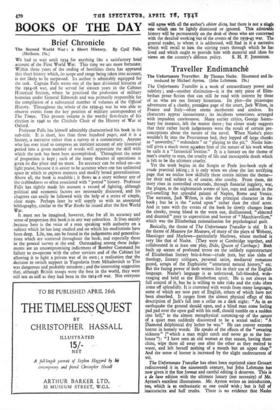BOOKS OF THE DAY
Brief Chronicle
The Second World War : a Short History. By Cyril Falls. (Methuen. 15s.)
WE had to wait until 1934 for anything like a satisfactory brief
account of the First World War. This time we are more fortunate. Within three years of the ending of hostilities there has appeared this short history which, its scope and range being taken into account, is not likely to be surpassed. Its author is admirably equipped for the task. Captain Falls wrote one of the best divisional histories of
the 1914-18 war, and he served for sixteen years in the Cabinet Historical Section, where he practised the profession of military historian under General Edmonds and was primarily responsible for the compilation of a substantial number of volumes of the Official.
History. Throughout the whole of the 1939-45 war he was able 'to observe events from the key position of military correspondent of The Times. This present volume is the worthy first-fruits of his election in 1946 to the Chichele Chair of the History of War at Oxford.
Professor Falls has himself admirably characterised his book in its sub-title. It is short, less than three hundred pages, and it is a history, a narrative rather than a survey or a commentary. Anyone who has ever tried to compress an intricate account of any historical period into a given number of words will appreciate the skill with which the task has been here accomplished. Throughout the sense of proportion is kept ; each of the many theatres of operations is given its due place and no more. Its accuracy can be relied on—no light praise, because it is easier to be accurate when one has unlimited
space in which to express nuances and modify broad generalisations. Above all, the book is readable ; it flows as, a story without any of
the crabbedness so often associated with " potted " history. Professor Falls has rightly made his account a record of fighting, although political and economic factors are necessarily discussed, and his chapters can easily be followed with the help of a series of simple, clear maps. Perhaps later he will supply us with an annotated bibliography, similar to the War Books he issued after the first World War.
It must not be imagined, however, that for all its accuracy and sense of proportion this book is in any way colourless. It lives mainly „beCause here is the voice of a man speaking with authority on a subject which he has long studied and on which his meditations have been deep. Life, too, can be found in the judgements and generalisa- tions which are scattered throughout the book, and especially those in the general survey at the end. Outstanding among these judge- ments are an uncompromising indictment of Bomber Command for failure to co-operate with the other services and of the Cabinet for allowing it to fight a private war of its own ; a realisation that the decision to switch support in Yugoslavia from Mihailovitch to Tito was dangerous and probably mistaken ; and the interesting suggestion that, althoUgh British troops were the best in the world, they were still not as stiff as they had been in the 1914-18 war. Not everyone will agree with all the author's obiter dicta, but there is not a single one which can be lightly dismissed or ignored. This admirable history will be permanently on the desk of those who are concerned with the detailed working but of the events of the x939-45 war. The general reader, to whom it is addressed, will find in it a narrative which will recall to him the stirring years through which he has lived and which ought to provide him with material and ideas for
views on the country's d&fence policy. S. H. F. JOHNSTON.






























 Previous page
Previous page